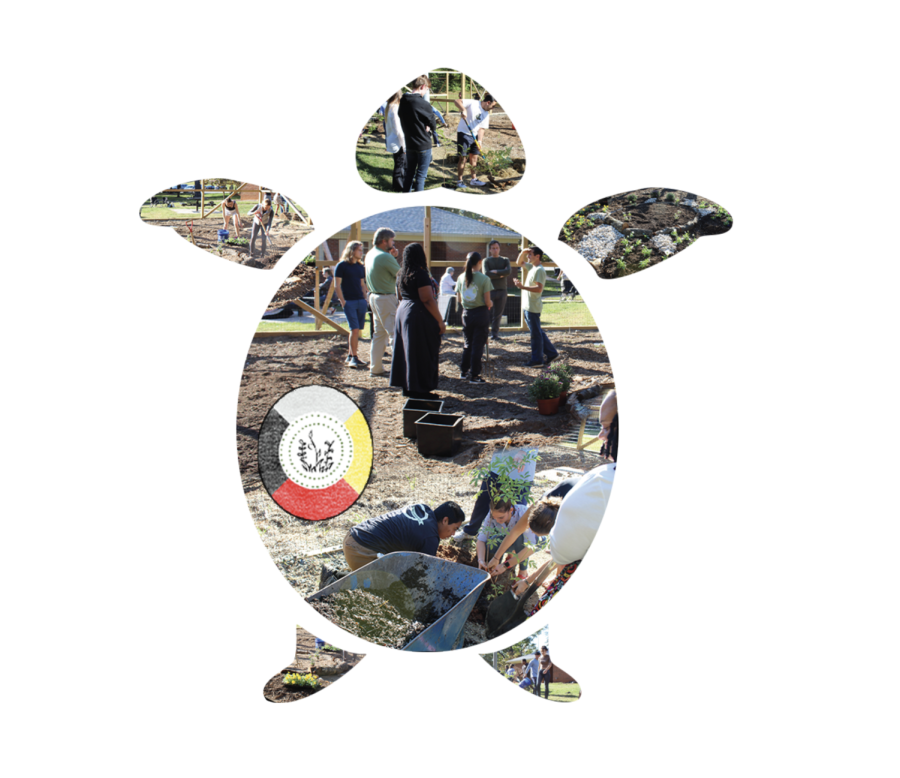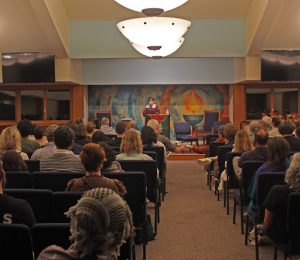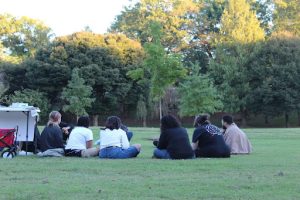Fostering connections on Indigenous Peoples Day
The celebration of people, land, and nature focused on Indigenous traditions and historical land use
Indigenous Peoples Day events at Wake Forest honor Indigenous teachings and sustainability practices.
October 19, 2022
On Monday, Oct. 11, the Office of Sustainability partnered with the Intercultural Center to host a celebration for Indigenous Peoples Day. This event featured the planting of a new campus garden behind Piccolo Hall — the Three Sisters Garden.
The name “Three Sisters” pays homage to a Native practice of companion planting. This practice involves planting a combination of crops near one another to increase crop productivity. The three sisters in some Indigenous cultures include corn, squash and beans.
The venue was a celebration in itself — Three Sisters Garden was created via partnerships with local and regional tribes with the intention of promoting Indigenous leadership, knowledge and culture. The university specifically looks to raise the voices of Indigenous groups upon whose land the Reynolda Campus resides. These include the Saura, Catawba, Cherokee and Lumbee tribes.
“Tending the garden is a small act of remembrance that directs our community’s attention toward the Indigenous nations that cared for the land on which our university resides,” said Nathan Peifer, program coordinator with the Office of Sustainability, in a statement to the Old Gold & Black.
Peifer continued: “From forest care to food production, Indigenous wisdom can help us transform our current systems of management and production.”
Students attending the event were able to take part in planting and landscaping within the garden. Following this, attendees shared a meal catered by Chef Jordan Rainbolt of Native Root. Native Root is headed by Rainbolt and strives to cultivate learning opportunities and the sharing of cultures through food — paying attention to both Indigenous cooking traditions and the seasonal changes of crops.
Many people around the United States still celebrate Columbus Day, but recent years have brought about a new day of celebration in its place — Indigenous Peoples Day. This holiday has given many Indigenous individuals a platform to celebrate their heritage and honor their traditions, many of which were repressed by colonizers like Columbus.
This, however, is not a resolved issue, and many Native practices are still shunned by Western cultures. The oppression of Indigenous cultures is becoming a more publicly recognized social justice issue, but many still neglect to capture the full scope of it.
Not only is this topic a social justice issue, but it is an environmental issue. Indigeneity and environmental justice have long been intertwined topics, as Indigenous environmental practices are often inhibited by American overconsumption.
Despite this, Indigenous populations still succeed in advocating for their communities and educating others on their traditions and cultural practices. This act of education was supported by Wake Forest on Indigenous Peoples Day in a celebration of local Indigenous people.
In addition to the educational efforts by the Office of Sustainability and the Intercultural Center, Indigenous students also allow space for conversation. Mahlea Hunt, a Wake Forest senior and a member of the Lumbee tribe, was involved in the hosting of this Indigenous Peoples Day event. The Lumbee Tribe of North Carolina is located in Cumberland, Hoke, Robeson and Scotland counties.
“It was amazing growing up being around so many cultural leaders,” said Hunt. “I have been working for the tribe since I was five years old doing advocacy work.”
Hunt has continued that advocacy work into her time here at Wake Forest, raising awareness of Indigenous issues and working closely with the Intercultural Center. In doing this, Hunt has not only faced the challenges of educating beyond biases, but has had to navigate this process while attending a predominantly white institution.
“All my life, my schools were 95% Native American,” said Hunt. “[At Wake], I’m a part of the one percent of Native Americans.”
Celebrations such as the one held on Indigenous Peoples Day allow Hunt and other Indigenous members of the Wake Forest community to share some pieces of their cultures and traditions. Some of the traditions Hunt shared include a smudging ceremony, a song presentation and a talking circle.
Smudging is a closed practice that involves the burning of sacred herbs as a means to encourage balance and healing. The talking circle is a practice of sharing and educating in a way that encourages equality between participants. It is a space for participants to share their experiences and teach one another about any given topic.
“A lot of students that I have come in contact with don’t know a lot about Indigenous people or our issues…because they weren’t taught it,” said Hunt. “I think that’s the first step — to educate [others] about what is going on.”
Hunt has done a lot of her work alongside Savannah Baber, the assistant director of the Intercultural Center. Baber is a member of both the Lumbee Tribe of North Carolina and the Chickahominy Tribe of Virginia. She was the first Wake Forest student to be named a national Udall Scholar for her research in tribal public policy.
“I think that Wake is aware of the importance of being inclusive in a way that it wasn’t when I was a student,” said Baber.
According to Baber, Indigenous Peoples Day at Wake Forest initially began as a protest of Columbus Day. This year is the first year in which there was not a protest, but rather a celebration.

Looking toward the future, the Office of Sustainability is hopeful that next year’s celebration will be accompanied by harvesting the newly founded Three Sisters Garden. Though a small step, managing our campus’ environmental impact through the teachings of Indigenous traditions will cultivate not only an environmental change, but a community of students willing to learn from individuals of all cultural backgrounds.
The benefits of growing these crops together are plentiful. According to Native Seeds, a nonprofit conservation group based out of Tucson, Arizona, the corn provides a stalk for the beans to climb so that they are not out-competed by the squash. The beans provide nitrogen to the soil and stabilize the corn stalks, and the squash leaves shade the ground to help retain soil moisture and prevent weeds.
The consequences of gardens not being tended to in a sustainable way can be seen in many agricultural organizations. Many large-scale agricultural groups are involved in the process of overcropping — using a plot of land beyond its capacity and depleting the soil of nutrients. Nutrient depletion in the soil may also be due to crop monoculture and a lack of biodiversity in fields. These practices often lead to less crop yield, which drives companies to turn to artificial fertilizers and pesticides to maintain their fields.
The use of these supplemental products comes with its own set of risks. For one, it prevents the soil from regaining its own nutrients to provide the plants. Additionally, runoff pollution from fertilizers and pesticides has wreaked havoc on many communities’ water supplies. Indigenous Peoples are disproportionately affected by these issues, with an estimated one in ten Indigenous Americans lacking access to safe drinking water.
November is Native American History Month, and the Intercultural Center will host events throughout the month that continue to celebrate Native cultures and heritage. The Office of Sustainability will once again be partnering with the Intercultural Center to host Tohi Talks — conversations linking Indigeneity and environmental justice at the Tohi Garden located behind Angelou Residence Hall.














